PS Audio has been steadily working their way up the audiophile food chain for over 40 years. My first exposure to them was with their power conditioning and regeneration, or PowerPlant, products. Then they made a splash with their highly-praised PerfectWave line of digital products. Recently, they jumped into the loudspeaker market with their Aspen Series of products. The latest addition to the PS Audio portfolio is the yet-to-be-released PMG Signature (meaning Paul McGowan designed) line of products. These are designed to compete with the best, offering a no-compromise product at reasonable prices. Yes, $8,999 is, relatively, a lot of money for an audiophile component, but a downright bargain compared to some of the ultra-high-end equipment that seems to be all the rage lately.
How can PS Audio offer such value? PS Audio does things differently and many audiophile consumers love them for it. For example, there is no dealer network to navigate, as they sell direct these days. PS Audio also offers a gracious 30-day in-home trial. What consumer is going to argue with that? Few to none. They even have a trade-in program to keep their customers from being burned trying to sell used units on Audiogon or wherever you sell your used audio gear (learn some tips on that topic here). It keeps them in the PS Audio family and makes writing the check for a PS Audio component a low-stress decision. Smart move.
The PS Audio PMG Signature preamplifier is from the new, top-line Signature series from PS Audio. The Signature line includes (or will soon include) a DAC, an SACD transport, a phono preamplifier and the PMG Signature preamplifier. These products are the first from PS Audio to commemorate the founder and CEO Paul McGowan with his initials, so they’d better be something special.
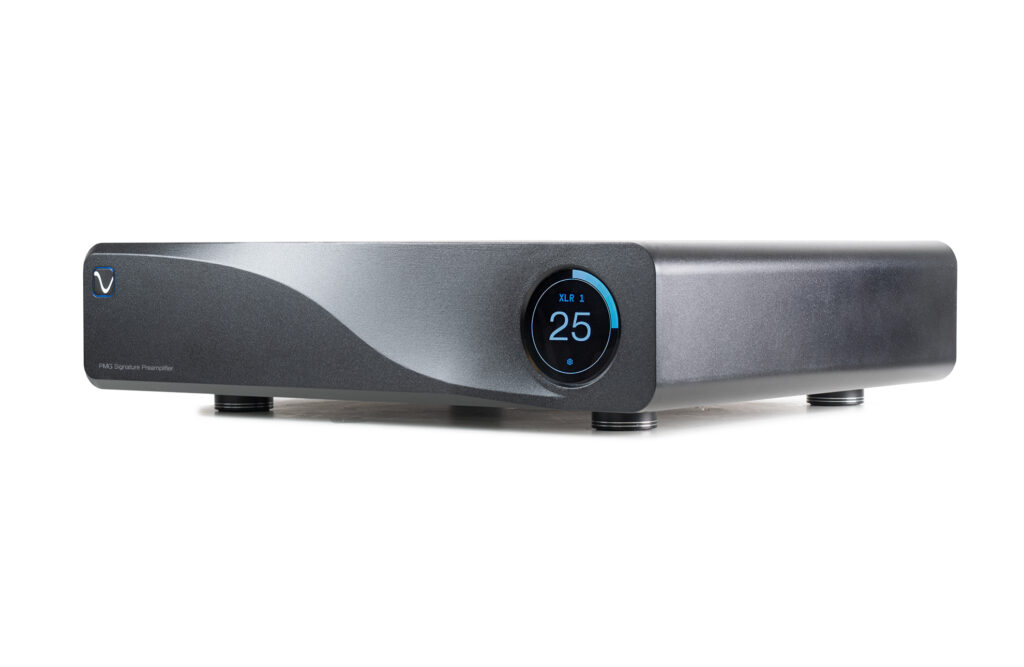
What Makes the PS Audio PMG Signature Preamplifier So Special?
- The PS Audio PMG Signature preamplifier is built from the ground up as a no-compromise audiophile component. This is the first PS Audio component to bear the name of the founder and CEO Paul McGowan.
- The PS Audio PMG Signature preamplifier has an astonishingly low noise floor, letting you hear every detail of a recording. PS Audio lists the noise floor at -145 dB, virtually unmeasurable.
- The PS Audio PMG Signature preamplifier is fully balanced from input to output, with a zero-feedback Diamond buffer. This configuration results in greater speed and transparency, bringing the listener closer to the source material.
- The PS Audio PMG Signature preamplifier has a unique gain stage that combines the best of FET and BJT transistor characteristics. FET, or Field-Effect Transistors, use a voltage/electric field to control the flow through the transistor and are extremely linear in operation, with low noise, resulting in smoothness and grain-free sound. BJT, or bipolar junction transistors, use an electric current to control the flow through the transistor and are known for dynamics and punchiness. The gain stage in the PS Audio PMG Signature preamplifier combines both these characteristics to give a smooth, refined open sound with powerful drive.
- The PS Audio PMG Signature preamplifier power supply uses dozens of large high-performance film capacitors, instead of the typical large electrolytic capacitors. Film capacitors offer many advantages, including speed, lifespan and reduced noise, giving a more transparent window to the music.
- The PS Audio PMG Signature preamplifier offers software-controlled direct coupling, as well as AC coupling, for every input. Direct coupling removes the protection capacitor that would block DC from entering the preamplifier. This results in higher performance, as the protection capacitor will slightly color the sound. If you have a source with DC offset, the capacitor can be enabled, protecting the rest of your system. I used the direct coupling setting for my listening but did experiment with the AC coupling, and found the difference to be subtle but audible.
- The PS Audio PMG Signature preamplifier is a single-box unit in a world of multiple boxes. Typically, top-level preamplifiers include at least two chassis, if not more, to accommodate outboard power supplies. Most of us don’t have truly dedicated listening rooms and walls of rack space, making a high-performance single-chassis component a real blessing.
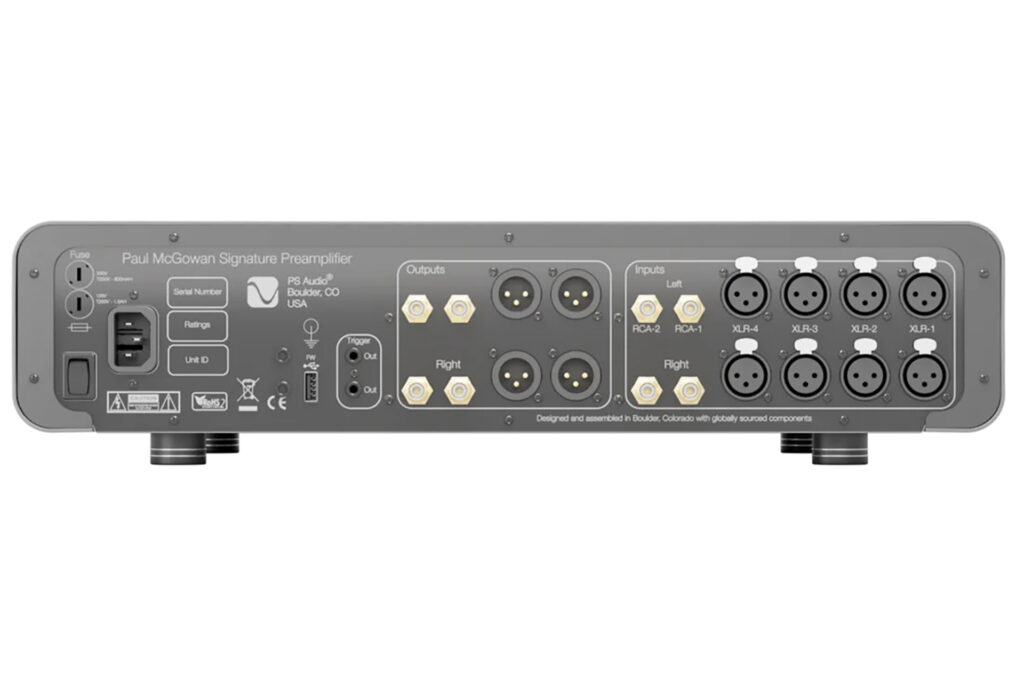
Why Should You Care About the PS Audio PMG Signature Preamplifier?
The PMG Signature line of components represents the best of what PS Audio can build. The PS Audio PMG Signature preamplifier is the first of four products that make up the Signature line, to be followed shortly by a DAC, a transport and a phono stage.
As exciting as a new line of products may be, if they don’t deliver the goods sonically, they will quickly be forgotten. The PS Audio PMG Signature preamplifier is not something you will forget about after hearing it. It’s one of the most transparent preamplifiers I’ve heard. The work that designer Darren Myers did to eliminate noise and improve speed in the circuitry paid off. It’s worthy of carrying the PMG signature moniker.
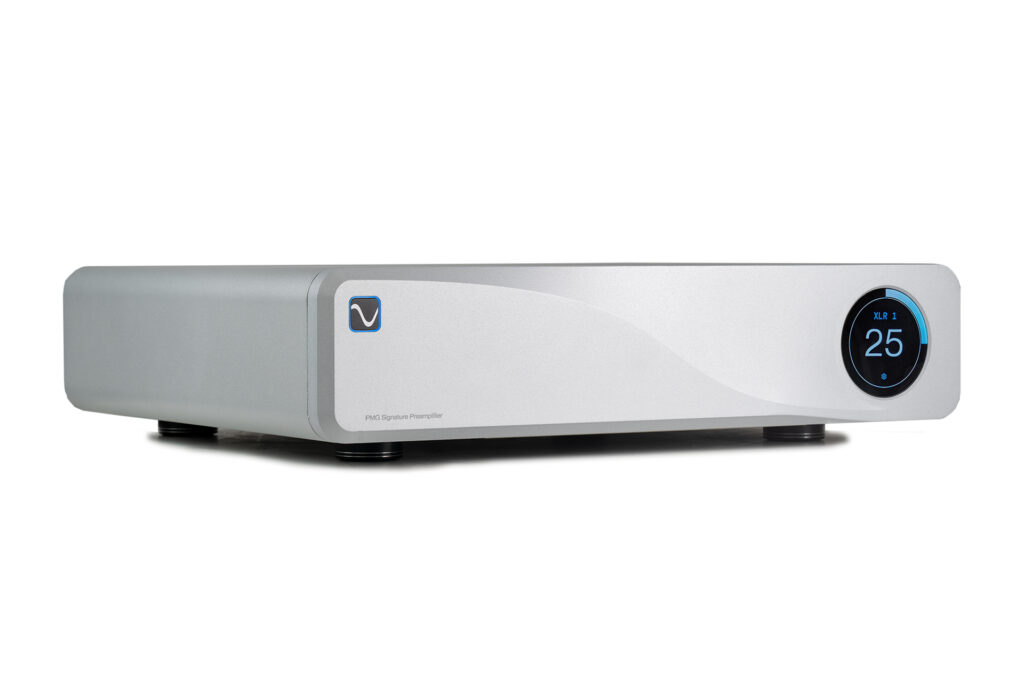
Some Things You Might Not Like About the PS Audio PMG Signature Preamplifier
- The PS Audio PMG Signature preamplifier is physically controlled by touchscreen only – meaning no buttons on the front faceplate. Let me be clear, I absolutely hate touchscreens. I much prefer buttons to press and knobs to turn. With that said, the touchscreen on this unit is damn good. It’s the most intuitive touch screen that I’ve ever used. The volume control ring is smart and tracks finger movements perfectly. Want to change the input? Simply touch the current input and a menu pops up with all other inputs – click the one you want. All the sub-menus operate the same way. It’s very efficient and slick.
- The remote control that comes with the PS Audio PMG Signature preamplifier is a letdown. Don’t misunderstand: the remote functions perfectly fine and has direct access to every function you will need. It also is backlit, which is always a welcome feature. My problem with it is that it feels like the same plastic universal remote you’d get for under $10 on Amazon. PS Audio spruced it up a bit by overlaying a piece of aluminum over the top. Even so, the remote still feels cheap. A preamp of this caliber and cost deserves better.
- The PS Audio PMG Signature preamplifier styling is understated but still handsome. If you want a flashy box that will draw oohs and aahs, look elsewhere. This has a look and textured feel that is more industrial than luxurious,which I really liked. There are no right angles to be found anywhere on the case. The face of the unit has a unique three-dimensional wave that traverses it, but the large touchscreen display on the right side is what draws your attention. The casework and design philosophy are the same for all the signature products. A stack of PS Audio PMG Signature gear will look killer, whether you choose silver or black.
Listening to the PS Audio PMG Signature Preamplifier …
My system consists of a Lumin U1 mini streamer, a Weiss Helios DAC, a CH Precision M1.1 amplifier and Rockport Avior II loudspeakers. The PS Audio PMG Signature preamplifier was connected to the amplifier and DAC using Wireworld series 10 Platinum Eclipse XLR cables.
George Michael’s Faith album is a long-time reference. Every track brings something unique to the table. Whether it’s the poppy title track “Faith,” or the melancholy “Father Figure,” this album delivers from start to finish. Recording and production quality are topnotch, so audiophiles like me can geek out on what they are hearing. Having sold more than 25 million copies and certified diamond by RIAA, clearly, I’m not the only one who rocks this album. “Hard Day” is in my top five for testing the low-end performance of a system. If you haven’t listened to this track, do yourself a favor and check it out. Don’t be surprised, however, if your system struggles, as it’s an intense workout for your amp and woofers. The track features former Wham! bassist Deon Estus, who delivers an outrageously funky performance. Estus’ bass guitar, along with the drumming of Ian Thomas, through the PS Audio PMG Signature preamp was some of the best low end I’ve ever heard, period. It was fast and deep, like subterranean deep, but still completely musical and natural. Each note pressurized my room with wave after wave of groove, even at low volumes. It was as if there was a “loudness” button hidden somewhere, but there wasn’t. This is the result of all the attention paid to driving noise out of the circuitry. Michael’s outstanding vocals floated above and in front of the rhythm section, creating a realistic soundstage, although not quite as deep or defined as that of my reference CH Precision preamplifier setup, which admittedly costs multiple times what the PS Audio PMG Signature preamp does. The PS Audio PMG Signature preamp was very impressive-sounding. Its performance would lead me to believe it costs significantly more than what PS Audio is asking.
“Here Comes My Girl” by Tom Petty and the Heartbreakers is a classic that I’m sure you’ve heard hundreds of times. I know I have. It’s not what I would consider an audiophile recording, but it still sounds really good. I noticed lots of cool things listening to it through the PS Audio PMG Signature preamp. Right from the opening drum fill, I heard the cymbal crash dead center in the soundstage and shimmer out past the sides of each of my speakers, around the room, then behind me. That was totally unexpected but impressive. Throughout the track, Petty alternates talking and singing. During the speaking sequences, I heard an unmistakable yet subtle echo of each word in one of my favorite lines, “Watch her walk.” PS Audio claims an ultra-low -145 dB noise floor for this preamp, which explains why hearing the echoing vocals was so effortless. When a musical signal stands alone and doesn’t have to compete with noise, everything is clearer, more defined and just better. Petty’s trademark raspy voice was clear but never got aggressive, which I have heard happen with other electronics. Mike Campbell’s guitar strums have a gritty yet beautiful tone that works perfectly with Petty’s voice. The PS Audio PMG Signature preamplifier showed that it doesn’t need audiophile recordings to sound great.
Will the PS Audio PMG Signature Preamplifier Hold Its Value?
Absolutely, yes. PS Audio is a well-respected company that has been in business for over four decades. They build high-quality products, offer great customer service and an excellent trade-in program. In my experience, PS Audio customers are very loyal, and the brand has an almost cultlike following. Considering how good the PS Audio PMG Signature preamp sounds, I don’t think used versions will stick around long, should an owner decide to move on from it.
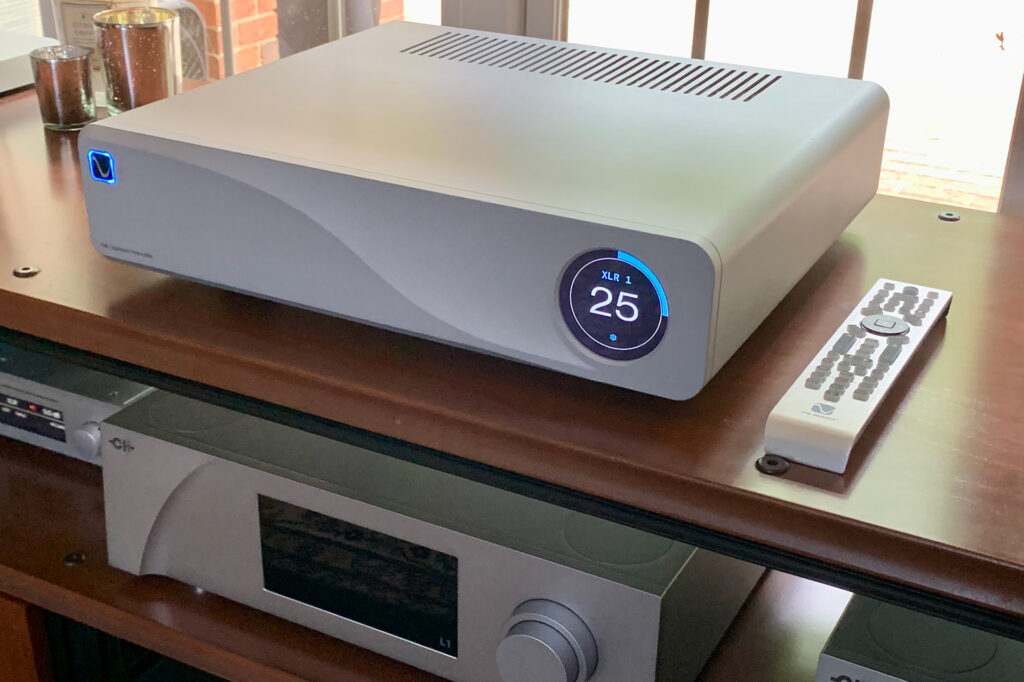
What is the Competition for the PS Audio PMG Signature Preamplifier?
I recently purchased the $10,000 Pass Labs XP-22 (read the review) and clearly view it as a competitor to the slightly less expensive PS Audio PMG Signature preamplifier. The XP-22 is a two-chassis unit, with a separate power supply and both stereo signals in a single chassis. The Pass Labs XP-22 is more traditional, with buttons and a downright glorious volume knob, compared to the futuristic touchscreen from PS Audio. The PS Audio PMG Signature preamplifier gets the slight nod in terms of dynamics over the Pass Labs XP-22, but I still hold the XP-22 near and dear to my heart.
Another preamplifier I see as a competitor to the PS Audio PMG Signature preamplifier is the Mark Levinson No. 5206. The $11,000 Mark Levinson No. 5206 preamplifier includes features that separate it from the PS Audio and Pass Labs offerings, namely an internal DAC and phonostage, not to mention an aptX Bluetooth receiver, MQA decoding and even a high-pass subwoofer filter. I typically prefer to keep all the extra functions that the No. 5206 offers separate. However, for a young future audiophile, this rich feature set offers significant value to get started. The Mark Levinson is gorgeous to look at as well, which doesn’t hurt, either.
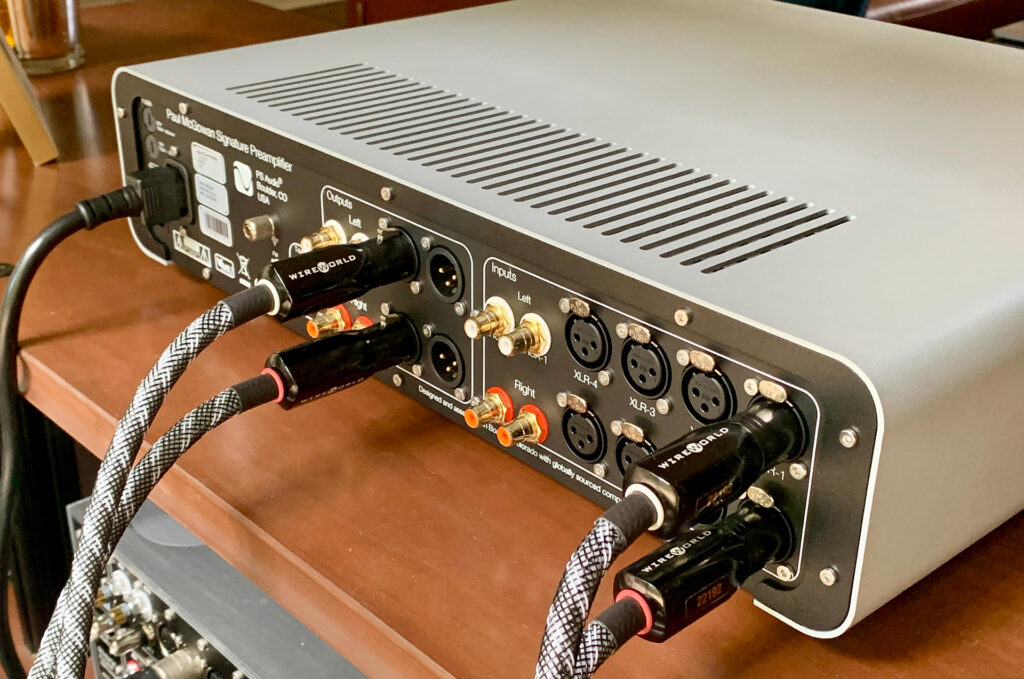
Final Thoughts on the PS Audio PMG Signature Preamplifier …
PS Audio has hit an audiophile homerun with the PMG Signature preamplifier. Sonically, it checks all the boxes that I want from an audiophile preamplifier. It is uber-transparent, letting me hear deeply into every track I played through my system. It’s also extremely quiet, letting me hear fantastic detail and dynamics, even at very low volume levels. This is important when you have a wife who goes to bed early and a five-year-old. I could listen late into the night at low volumes and not miss anything. The bass performance was just fantastic, up there with the best that my system has ever produced.
FutureAudiophile.com publisher, Jerry Del Colliano, and I recently had a spirited audiophile debate about a preamplifier being a straight wire with gain. My contention is it’s a great aspiration, but all but impossible to achieve. After all, how do you know if you’ve done it? Unless you were at the recording session and have perfect memory of it, we are all guessing what it actually sounded like. Hell, even the recording equipment has an impact on the original sound. An oscilloscope is a useful tool, but it can only tell you so much, and it is no replacement for a brain and a pair of ears.
My argument was that, as consumers, we piece together our system to give us the sonic reproduction that we like most. This cable adds a touch of warmth, this DAC gives me a little bit more air, this power cable brings focus, and on and on and on. All of this is okay and should be embraced, in my opinion. Is the PS Audio PMG Signature preamplifier a straight wire with gain? Maybe, but hell, I don’t know. What I can say is that it sounds damn good. If you’ve got the upgrade itch and are shopping for a statement preamplifier, you absolutely must audition one, even if you are shopping for preamps that are as much as double the price. This preamp is just that good.




Excellent review of the specific attributes of the PMG Preamp. Hope you can review the new Topping D900 DAC Preamp, the Schiit Kara F preamp and one of the new Apollon amplifiers.
Topping and Schiit would be most likely
AND YES… I take requests!!! 🙂
Thank you Angel! I appreciate the positive words 👍
Not having a volume knob is a huge problem for me and the styling is nothing special. But if it sounds great like you say, it will do well.
Maybe Paul will come out with a less expensive model with a normal(cheaper) faceplate and real knobs.